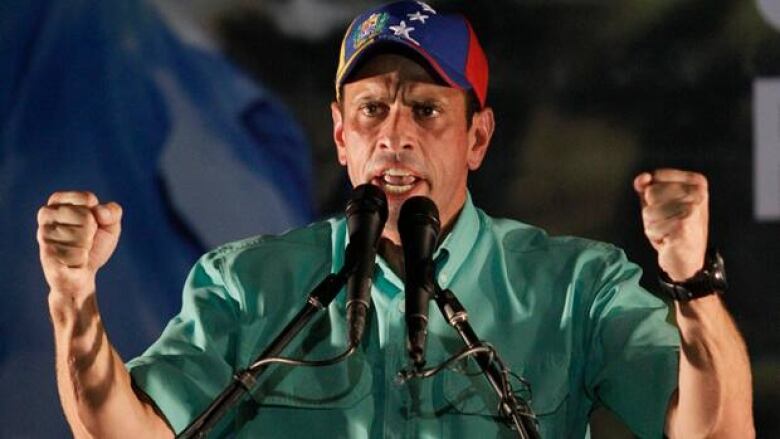Venezuela governor picked to challenge Chavez
Henrique Capriles using non-confrontational approach in campaign

A youthful state governor has won Venezuela's first opposition presidential primary by a wide margin, emerging Sunday as the candidate who will try to end President Hugo Chavez's 13 years in power.
Henrique Capriles, the 39-year-old governor of Miranda state who describes himself as a centre-left progressive, faces a tough task in ousting Chavez, a charismatic campaigner with a loyal following and the full powers of the state to back his candidacy in Oct. 7 elections.
Opposition election chief Teresa Albanes announced the preliminary results, saying Capriles won about 62 per cent of the vote, beating Zulia state Gov. Pablo Perez by a margin of more than 30 percentage points.
Chavez's opponents lined up to vote in many areas, surpassing most expectations with a turnout of about 2.9 million ballots cast out of Venezuela's 18 million registered voters. Capriles had been the front-runner in pre-election polls among five contenders, presenting a younger, energetic alternative to the Chavez, 57, who has recently battled cancer.
]"He's going to be the candidate who can get us out of this giant hole we're stuck in," said Carmen Gloria Padilla, 66, a telephone company employee who voted for him.
Thousands of supporters celebrated the win outside Capriles's campaign headquarters, some holding small flags bearing the slogan "There is a way." Fireworks exploded in the sky overhead.
"I aim to be the president of all Venezuelans," Capriles told the crowd, wearing a baseball cap emblazoned with the yellow, blue and red of Venezuela's flag. "It isn't the time of lefts or rights. It's the time of all Venezuelans."
His four defeated rivals promptly united behind Capriles and joined him on the outdoor stage. Standing side-by-side, they grasped hands and raised them.
"In union there's strength!," Capriles shouted.
Some of Capriles's supporters say they think he has a good chance of winning over Venezuelans who otherwise might lean pro-Chavez because he has taken a largely non-confrontational approach toward the president while promising solutions to problems including inflation running at 26-per cent and one of the highest murder rates in Latin America.
Diego Prada, a 23-year-old marketing manager, said he thinks Capriles's inclusive approach offers a much better shot against Chavez than other competitors who have taken a hard line against the president.
"People are tired of so much confrontation," Prada said. And Capriles, he said, offers "a message of unity."
The once-divided opposition has gained popularity in recent years, and the race could end up being the toughest re-election bid of Chavez's career. The leftist president easily won re-election with 63 per cent of the vote in 2006, but since then his popularity has declined, in part due to ills including crime and economic troubles.
Chavez remains strong
Chavez's approval ratings have topped 50 per cent in recent polls, and his struggle with cancer doesn't appear to have hurt his popularity. The president says he's cancer-free after undergoing surgery and chemotherapy in Cubalast year, and has been energetic in his hours-long television appearances, apparently trying to show he can still keep up with a younger challenger.
Chavez remains a hero to many of his supporters and maintains a visceral connection to a significant segment of the poor in Venezuela. He also will use the full powers of his government and a bonanza of public spending to try to ensure a victory in the Oct. 7 election.
Chavez has already kicked his campaign machinery into gear. He has increased government spending by launching new social programs that offer cash benefits for the poor and invested heavily in new railways, public housing and cable car systems in Venezuela's sprawling hillside slums.
As the election nears, he will inaugurate other big-ticket projects that grab attention, including the planned launch of Venezuela's second Chinese-made satellite shortly before the October vote.
Chavez has warned voters that if they don't re-elect him, his social programs called "missions" would vanish. That threat, though disputed by Capriles, could have an influence on some in the run-up to the vote.












_(720p).jpg)


 OFFICIAL HD MUSIC VIDEO.jpg)
.jpg)



























































































